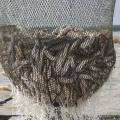Crop Report from 2023
Mississippi corn producers got off to an early start and have enjoyed mild spring weather in 2023, advantages that gave this year’s crop a good start.
The U.S. Department of Agriculture estimated that as of May 21, 98% of Mississippi’s corn was planted. To date, 69% is in good or excellent condition, with another 27% listed as fair.
STARKVILLE, Miss. -- Anytime conditions allow soybean growers in Mississippi to begin planting in April, they have started on the right foot.
On the week ending June 4, 93% of the state’s crop was in the ground, and 87% was reported emerged; both percentages are just ahead of state five-year averages.
Mississippi’s cotton crop was in the ground by the second week of June, although fewer acres were planted this year because of low prices and high production costs.
Brian Pieralisi, cotton specialist with the Mississippi State University Extension Service, said cotton planting was essentially complete by mid-June. Any unplanted fields intended for cotton were too wet to plant and will likely be switched to soybeans instead.
Mississippi’s 2.3 million acre soybean crop is looking strong late in its growing season, thanks to somewhat earlier planting dates and almost ideal conditions through the end of July.
STARKVILLE, Miss. -- As long as feeding catfish stays pricey, anticipate paying more for fillets at the grocery.
“High grain prices in recent years have pushed catfish feed prices to $495 to $525 per ton, depending on protein level,” said Jimmy Avery, Mississippi State University Extension Service aquaculture professor at the Delta Research and Extension Center in Stoneville. Five-year averages for 32% protein feed hovered in the $375-to-$420-per-ton range between 2017 and 2021.
High temperatures and drought since early July left some cotton acreage not worth harvesting, while others with irrigation may still make an excellent crop in Mississippi.
“Statewide, cotton yields are highly variable depending on where you’re standing,” said Brian Pieralisi, cotton specialist with the Mississippi State University Extension Service.
Mississippi hay growers harvested at least 28 percent less hay this year than usual because of the drought that reached extreme levels in parts of the state. Brett Rushing, Mississippi State University Extension forage agronomist, said hay producers in the state typically get three cuttings a year, and often four if they manage well and the weather cooperates.
STARKVILLE, Miss. -- Most of Mississippi’s sweet potatoes are grown far northeast of the state’s worst drought conditions, but that did not keep excessive heat and dryness from factoring in this year’s crop.
Lorin Harvey, sweet potato specialist with the Mississippi State University Extension Service, said dry weather affected production more than most growers anticipated. Because of the drought, irrigated acres performed better than potatoes on dryland.
A late freeze, high summertime temperatures and a devastating drought mean a poor pecan crop for Mississippi in 2023.
Eric Stafne, fruit and nut specialist with the Mississippi State University Extension Service, said weather stacked the odds against a good crop this year.
RAYMOND, Miss. -- Michael May expects to see tree growth impacted for at least the next three years on his Chunky, Miss., Christmas tree farm after this year’s severe to exceptional drought conditions that spanned most of the state.
Extreme drought from July onward is expected to significantly reduce the state’s winter wheat crop that is typically small compared to the primary summer crops, but recent rain may help what was planted.
The U.S. Department of Agriculture estimated that, as of Nov. 26, 82% of the state’s wheat had been planted, 71% emerged, and only 50% was in good or excellent condition.











